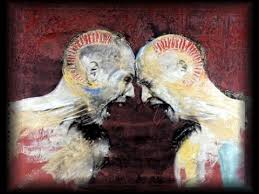
In a
perusal of the some excelent articles written by remarkable articulists in
several periodical about the violence, I would like to add some threads which
think be important to understand the violence as an emerging phenomenon in the
modern age.
In the
western societies the democracy nowadays, are facing hard times to overcome
troubles that were underlying to the ordinary man who the only task and desire
was to work, produce wealth, create and protect the family, all the others
services and works revolved around these axes as accessory sets. Living in a
world of extreme competition to acquire things and values, most of competitors
ended up falling behind, while others still go on in search of or enjoying the
goods acquired. This is the world of utilitarianism of "Benjamin Bentham".
However,
would be naive to think that this mass of disgruntled or not included people
which could not afford the wealth pleasures and achieve the promissed dream
laid out by the ruling classes, would be accomodated and awaiting their turn to
be next winners in a stoic manner, not at all. The time is changed fast and
with the advent of social networks and apps, its easy to mobilize people around
the globe and gather them in a kind of spectrum acting on the underlying
emotions as a spate.
These
events call to mind the book of George Sorel : Réflexions sur la violence [Refletions on violence] one of his
excerpt about the violence and the turmoil said:
"Two of its themes have become a part of social science literature: the
concept of the social myth and the virtue of violence. To Sorel the
Syndicalist's general strike, the Marxist's catastrophic revolution, the
Christian's church militant, the legends of the French Revolution, and the remembrance
of June Days are all myths that move men, quite independent of their historical
reality. As one of Sorel's disciples (Benito Mussolini) said, men do not move
mountains; it is only necessary to create the illusion that mountains move.
Social myths, says Sorel, are not descriptions of things, but "expressions
of a determination to act."
As a mater
of fact, the violence in the modern society is associated with social
inequalities, frustration, politicial disappointment which molten with
unemployment, wars, immigrations, political and religious persecutions and
several appeals of ethnicities minorities, unable to embrace the default rules.
This pot of abominations is being poured out under the people, creating a
catalyst to outbreak in violence. The main purpose of such disruptive beahviour
is change the status quo, giving them an opportunity to be heard and included,
even if necessary to establish chaos to
offset the travails. although be a flawed logic.
Sorel saw
the violence as something epic, the only thing able to change the stereotype
rooted in the elites which the mainstrean was the power perpetuation. Such violence,
also can be described as, Areté, a greek word meaning a kind of virtue that only the nobles and
princes had owned, granted by gods. Platão and Aristóteles conceived the ideia
the human being must be in search of this virtue and once achieved, should be
applied in total “POLIS” benefit. In so far as the set up of virtuous citzens
was capable to perform any task in society.
On the
other hand, the violence practiced by some groups, are a revenge, an
appropriation of this virtue (areté) to be used against the Polis, the violence
praticed against citzens, societies, government, media, enviroment, etc,
becomes diffuse moviment,s a diversity of classes claiming their rights, they
create a myth, regardless if true or
fake, the most importante is to exercise the domain of mass, moving it and urging
them to action. Thus, arise the backdrop to set up turmoil and violence.
In short,
the democracies are the backbone of all goverment in the western countries.
Though it may not be fully perfect, but is still more suitable regime to the
mankind, however, should be improved in order to achieve the reduction of
social inequalities. Its not easy task, Jesus Christ had already noticed these
social flaws, as we can see in John 12:8
John 12:8 “The poor you have ever with you, but me you have not for ever.”
This is not a judgment, but an assertive, an advice for the mankind,
because He knew before hand that the man´s projects for the equal society is shoddy
and would be fraying over the years.
About the author:
Paulo
Oliveira S.Silvano
lawyer - Consultant
Extension in maritime law (shipping, oil & gas,
loss and averages, etc.)
"Expertise" in ports - having worked for 10
years in VALE ports.
Maritime repairs and Agency.
email: paulosilvano.juridico@gmail.com
Linkedin: BR.linkedin.com/in/paulosilvano
http://paulosilvano.blogspot.com.br
Notes:
Source:
image: https://www.google.com.br/search?q=imagens+sobre+intolerancia&rlz=1C1CHZL_pt-BRBR705BR705&espv=2&biw=1366&bih=589&tbm=isch&tbo=u&source=univ&sa=X&ved=0ahUKEwjMiLmvjLPSAhUHFJAKHZn8AVAQsAQIGQ#imgrc=CePyJjrj2msaTM:
5) http://www.iep.utm.edu/bentham/







Comentários
Postar um comentário